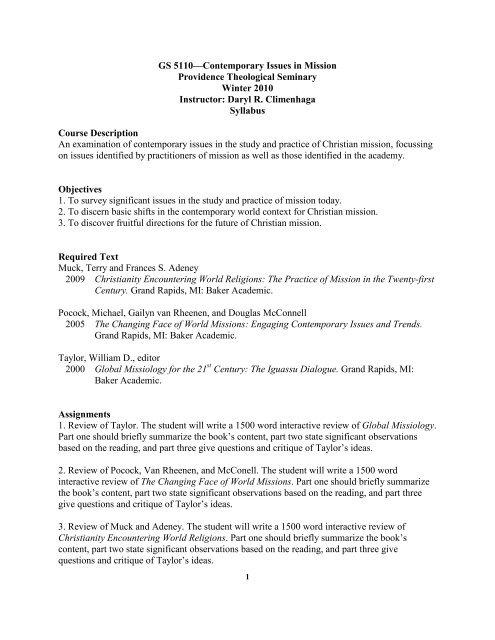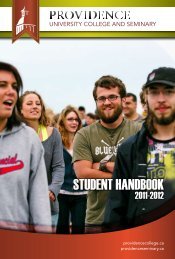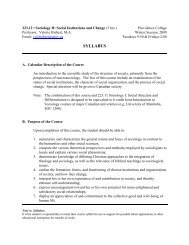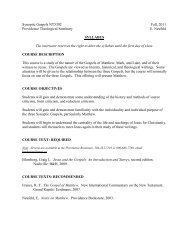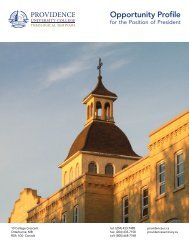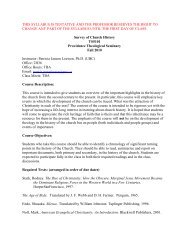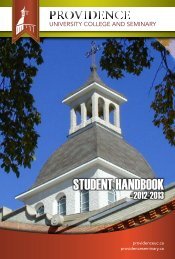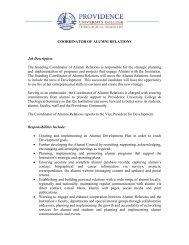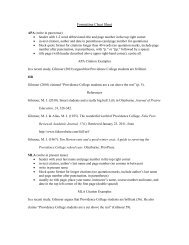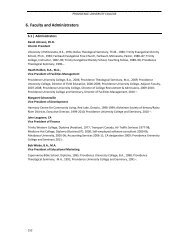GS5110 Contemporary Issues in Mission - Providence Theological ...
GS5110 Contemporary Issues in Mission - Providence Theological ...
GS5110 Contemporary Issues in Mission - Providence Theological ...
Create successful ePaper yourself
Turn your PDF publications into a flip-book with our unique Google optimized e-Paper software.
GS 5110—<strong>Contemporary</strong> <strong>Issues</strong> <strong>in</strong> <strong>Mission</strong><br />
<strong>Providence</strong> <strong>Theological</strong> Sem<strong>in</strong>ary<br />
W<strong>in</strong>ter 2010<br />
Instructor: Daryl R. Climenhaga<br />
Syllabus<br />
Course Description<br />
An exam<strong>in</strong>ation of contemporary issues <strong>in</strong> the study and practice of Christian mission, focuss<strong>in</strong>g<br />
on issues identified by practitioners of mission as well as those identified <strong>in</strong> the academy.<br />
Objectives<br />
1. To survey significant issues <strong>in</strong> the study and practice of mission today.<br />
2. To discern basic shifts <strong>in</strong> the contemporary world context for Christian mission.<br />
3. To discover fruitful directions for the future of Christian mission.<br />
Required Text<br />
Muck, Terry and Frances S. Adeney<br />
2009 Christianity Encounter<strong>in</strong>g World Religions: The Practice of <strong>Mission</strong> <strong>in</strong> the Twenty-first<br />
Century. Grand Rapids, MI: Baker Academic.<br />
Pocock, Michael, Gailyn van Rheenen, and Douglas McConnell<br />
2005 The Chang<strong>in</strong>g Face of World <strong>Mission</strong>s: Engag<strong>in</strong>g <strong>Contemporary</strong> <strong>Issues</strong> and Trends.<br />
Grand Rapids, MI: Baker Academic.<br />
Taylor, William D., editor<br />
2000 Global Missiology for the 21 st Century: The Iguassu Dialogue. Grand Rapids, MI:<br />
Baker Academic.<br />
Assignments<br />
1. Review of Taylor. The student will write a 1500 word <strong>in</strong>teractive review of Global Missiology.<br />
Part one should briefly summarize the book’s content, part two state significant observations<br />
based on the read<strong>in</strong>g, and part three give questions and critique of Taylor’s ideas.<br />
2. Review of Pocock, Van Rheenen, and McConell. The student will write a 1500 word<br />
<strong>in</strong>teractive review of The Chang<strong>in</strong>g Face of World <strong>Mission</strong>s. Part one should briefly summarize<br />
the book’s content, part two state significant observations based on the read<strong>in</strong>g, and part three<br />
give questions and critique of Taylor’s ideas.<br />
3. Review of Muck and Adeney. The student will write a 1500 word <strong>in</strong>teractive review of<br />
Christianity Encounter<strong>in</strong>g World Religions. Part one should briefly summarize the book’s<br />
content, part two state significant observations based on the read<strong>in</strong>g, and part three give<br />
questions and critique of Taylor’s ideas.<br />
1
4. F<strong>in</strong>al essay. The student will write an essay (approximately 3000 words) on the subject: “The<br />
Future of the Christian <strong>Mission</strong>ary Task <strong>in</strong> the New Millennium.” The essay will cover the issues<br />
that the class has decided are most important for us to consider.<br />
5. Class participation. Although not a percentage of the grade, non-participation can lead to a<br />
lower course grade, or failure of the course as a whole. Non-participation <strong>in</strong>cludes not com<strong>in</strong>g to<br />
class and not do<strong>in</strong>g assignments.<br />
Grades<br />
Taylor Review 25%<br />
Pocock et al Review 20%<br />
Muck and Adeney Review 20%<br />
Essay 35%<br />
Jan 12<br />
Feb 2<br />
Mar 1<br />
Apr 5<br />
Calendar<br />
Current <strong>Issues</strong>. The issues listed come from<br />
the <strong>in</strong>structor. We also seek to f<strong>in</strong>d what<br />
issues others say are critical today.<br />
19 The Bible and <strong>Mission</strong><br />
26 Motives and Models for <strong>Mission</strong><br />
Dependence, Independence, and<br />
Interdependence<br />
9 <strong>Mission</strong> Dei<br />
16 Group Report<strong>in</strong>g<br />
2<br />
Pocock et al Review due<br />
23 Indigenization: forms and mean<strong>in</strong>gs Muck and Adeney Review due<br />
Contextualization: theology as well as church<br />
8 March Intrasession<br />
15 Theology of Religions Taylor Review due<br />
22 Christology and <strong>Mission</strong><br />
29 Theology <strong>in</strong> the Two-Thirds World; New<br />
Religious Movements<br />
<strong>Issues</strong> Aris<strong>in</strong>g<br />
12 <strong>Issues</strong> Aris<strong>in</strong>g Major Essay due<br />
19 Exam Week
As part of the preparation for the 2003 version of the course, I contacted a number of <strong>Mission</strong><br />
Organizations. Below are those I contacted who responded to me, and their “current issues”<br />
1. Avant (Don Pickel)<br />
● The immensity of the task of tra<strong>in</strong><strong>in</strong>g national leadership on our fields - while GMU [Avant’s old name]<br />
is committed to this and always has been <strong>in</strong> its 110 year history, the task is enormous. Take for <strong>in</strong>stance, the<br />
highlands of Bolivia where, with national help, we have planted some 325 churches. The big problem that<br />
faces us there is that the average number of national pastors among those churches is 1-25. Then, too, the<br />
percentage of those who know how to read and write <strong>in</strong> those churches is approximately one per church.<br />
You can imag<strong>in</strong>e the immense task just there alone <strong>in</strong> gett<strong>in</strong>g people who will go <strong>in</strong> and commit themselves<br />
to a five-year commitment, learn the language and work <strong>in</strong> a team to tra<strong>in</strong> national leadership. Not many are<br />
available to do that today.<br />
● As GMU refocuses on its <strong>in</strong>itial mandate of church plant<strong>in</strong>g and seeks for excellence <strong>in</strong> those who are<br />
apply<strong>in</strong>g, we f<strong>in</strong>d there to be a paucity of potential workers who will go on a long-term basis. Just an added<br />
thought here. That those that are apply<strong>in</strong>g to us today, of course, must be conv<strong>in</strong>ced of the lostness of man<br />
without the Gospel. We are f<strong>in</strong>d<strong>in</strong>g quite a lot of feel<strong>in</strong>g aga<strong>in</strong>st that particular Biblical belief today.<br />
● We are seek<strong>in</strong>g to build <strong>in</strong>novative teams that can th<strong>in</strong>k strategically to go <strong>in</strong> among an unreached people<br />
group and there plant a church with<strong>in</strong> a five-year period. This is necessitat<strong>in</strong>g further tra<strong>in</strong><strong>in</strong>g of our<br />
appo<strong>in</strong>tees as well before they go.<br />
● The fund<strong>in</strong>g and pay<strong>in</strong>g for the process of putt<strong>in</strong>g such teams <strong>in</strong>to place and “re-<strong>in</strong>vent<strong>in</strong>g” GMU <strong>in</strong> these<br />
days is another area where we have need. The old paradigm of fund<strong>in</strong>g is just not go<strong>in</strong>g to work <strong>in</strong> what<br />
GMU envisions need<strong>in</strong>g to be done over the next few years.<br />
2. BICWM (John Brubaker)<br />
● Bridg<strong>in</strong>g to cross-cultural m<strong>in</strong>istry with a post-modern generation (screen<strong>in</strong>g, nurture, preparation,<br />
deployment, oversight, support).<br />
● Understand<strong>in</strong>g the new global dimensions of our work (everywhere to everywhere).<br />
● Deal<strong>in</strong>g with Muslim/Christian culture challenges given current global dynamics.<br />
3. EMC/EMMC (Lester Olfert)<br />
● Dependency/Paternalism.<br />
● Partnerships (develop<strong>in</strong>g partnerships with national churches <strong>in</strong> do<strong>in</strong>g foreign missions).<br />
● Recruitment of long term personnel (it is easy to get short term workers but we need workers for the long<br />
haul [Bible translation, Effective leadership tra<strong>in</strong><strong>in</strong>g and mentor<strong>in</strong>g]).<br />
● Develop<strong>in</strong>g new visions while deal<strong>in</strong>g with ris<strong>in</strong>g costs of missions and decreased f<strong>in</strong>ancial support.<br />
● <strong>Mission</strong>ary care (that is probably a separate topic).<br />
4. MBMSInternational (Gerald Hilderbrand)<br />
● Christology – the way that we (agency and denom<strong>in</strong>ation) work out our Christology and its implications<br />
for mission. Weak Christology derived from pluralistic North American culture.<br />
● <strong>Mission</strong>ary relationships with the constituency – we have to make more and more of a case to our<br />
constituency for support. Compet<strong>in</strong>g with the plethora of faith agencies.<br />
● <strong>Theological</strong> identity and <strong>in</strong>tegrity – that we speak with one voice an agency. Howard Snyder, Models of<br />
the K<strong>in</strong>gdom, as a resource for understand<strong>in</strong>g what we are talk<strong>in</strong>g about.<br />
● International partners – Mennonite Brethren churches around the world learn<strong>in</strong>g to work together. How<br />
do we do theology and mission when the largest church is <strong>in</strong> India (250,000 worshipp<strong>in</strong>g on a Sunday<br />
morn<strong>in</strong>g)? Learn<strong>in</strong>g how to sit at the table, but not as a power block, rather as a global community of<br />
churches.<br />
● Dependency and <strong>in</strong>terdependency – how do we move <strong>in</strong>to an <strong>in</strong>terdependent partnership.<br />
3
● Strategic orientation – evangelism and church plant<strong>in</strong>g, leadership, and social m<strong>in</strong>istry are three prongs of<br />
MBMSI. The first takes place especially among unreached peoples, the second among mission planted<br />
churches, and the third generally as part of the wholistic gospel.<br />
5. MC Witness (Peter Rempel)<br />
For a denom<strong>in</strong>ational mission agency some questions are:<br />
● Shall we plant churches for our own denom<strong>in</strong>ation or work with the denom<strong>in</strong>ations/ churches already<br />
present <strong>in</strong> or closest to the region?<br />
● How shall we prepare a church we have planted to function on its own resources and with <strong>in</strong>digeneous<br />
leadership?<br />
● How much do we encourage local congregations to <strong>in</strong>itiate and adm<strong>in</strong>ister their "own" cross-cultural<br />
missions?<br />
● Can we embrace a range of m<strong>in</strong>istries to non-Christians as mission?<br />
● How should a denom<strong>in</strong>ation relate to a mission agency/mission agencies (sodality vs. modality)?<br />
● How can we regard and steward all resources for mission <strong>in</strong> partnership and not only focus on the money<br />
which gives the North the apparent power?<br />
I've just read Earth<strong>in</strong>g the Vision by Kai Funkschmidt (<strong>in</strong> German) who reviews the transformations of the<br />
London, Paris and Bethel <strong>Mission</strong> societies <strong>in</strong>to CMS, CEVAA and UEM respectively. Very <strong>in</strong>terest<strong>in</strong>g.<br />
6. OM Canada (Harvey Thiessen)<br />
● The ma<strong>in</strong> issue is that the Great Commission rema<strong>in</strong>s an active, present task. It is not “f<strong>in</strong>ished” or near to<br />
be<strong>in</strong>g f<strong>in</strong>ished. No parts of the body of Christ have been decommissioned or absolved of any more<br />
responsibility.<br />
● There is a general disparity of wealth <strong>in</strong> missions (even <strong>in</strong> the same mission agencies) and typically those<br />
who have the wealth have the voice.<br />
● In terms of denom<strong>in</strong>ations, western leadership of ma<strong>in</strong> denom<strong>in</strong>ations tends to run toward liberalism<br />
while 2/3rds world leadership <strong>in</strong> the same denom<strong>in</strong>ation reflects an evangelical perspective. The western<br />
leaders still have greater sway with<strong>in</strong> the denom<strong>in</strong>ations and hold the key <strong>in</strong>ternational leadership positions,<br />
but the 2/3rds have the weight of a greater number of active adherents.<br />
● The <strong>in</strong>ternational agenda is still set by western issues, while those faced by the Indian, African, East Asian<br />
etc... church are given short shrift.<br />
7. SIM Canada (Tim Jacobson)<br />
<strong>Issues</strong> of concern to me:<br />
● Under-prepared people. Preparation that has a lacked rigorous experiential dimension.<br />
● How to relate to the national church. <strong>Mission</strong>s have yet to shed their paternalistic structures, attitudes, and<br />
policies. Mature partnerships between missions and national churches are rare.<br />
● Inter-personal skill development. People lack the theoretical as well as the experiential preparation<br />
necessary for effective relations, conflict management, etc.<br />
● Internationalization. <strong>Mission</strong>s are mov<strong>in</strong>g <strong>in</strong>to a “from anywhere to anywhere” mode and this is requir<strong>in</strong>g<br />
them to plan how to change to effectively <strong>in</strong>corporate multi-cultural teams.<br />
● Respond<strong>in</strong>g to human need. <strong>Mission</strong>aries need to learn to respond to the needs of their generation. One of<br />
those needs is AIDS. New missionaries for Africa and Asia should all know how to m<strong>in</strong>ister <strong>in</strong> a society<br />
where one out of every ten people (or even one out of every three people) will die of AIDS.<br />
● <strong>Mission</strong>s need to th<strong>in</strong>k about the full import of the Great Commission and the Great Commandment, not<br />
merely about the one-dimensional emphasis on the missiological fads of the day rather than costly, longterm,<br />
full-orbed missions that transforms a society. Some of the missiological fads relate to geography. We<br />
are neglect<strong>in</strong>g emphasis <strong>in</strong> some areas where cont<strong>in</strong>ued <strong>in</strong>vestment will beg<strong>in</strong> to yield a multiplied effect for<br />
the k<strong>in</strong>gdom.<br />
4
● Effectively us<strong>in</strong>g short-term missions is huge. It affects missions organization and strategy and<br />
recruitment and longevity. New missionaries need to know how to host short-termers and enlist their help <strong>in</strong><br />
the global task.<br />
I have a copy of a paper by Geoff Tunnicliffe on “Where is Global <strong>Mission</strong> <strong>in</strong> the Local Church?” I<br />
resonate with most of what he is say<strong>in</strong>g. I would highlight the follow<strong>in</strong>g: 1) more effective partner<strong>in</strong>g<br />
(agencies and send<strong>in</strong>g churches, agencies and receiv<strong>in</strong>g churches, agencies with other agencies, agencies<br />
with tra<strong>in</strong><strong>in</strong>g programs e.g. Bible colleges and sem<strong>in</strong>aries); 2) K<strong>in</strong>gdom-build<strong>in</strong>g vs. empire-build<strong>in</strong>g; 3) the<br />
chang<strong>in</strong>g role of agencies and their ability to adapt; 4) the chang<strong>in</strong>g role of many western missionaries to<br />
be<strong>in</strong>g servant facilitators and tra<strong>in</strong>ers rather than the primary front-l<strong>in</strong>e doers; 5) unplugg<strong>in</strong>g the<br />
mobilization pipel<strong>in</strong>e -- recruitment and support-rais<strong>in</strong>g; 6)mak<strong>in</strong>g a prom<strong>in</strong>ent role for short term mission<br />
<strong>in</strong>volvement, especially teams; 7) the focus on self rather than others <strong>in</strong> the western church; 8) the problem<br />
of churches send<strong>in</strong>g <strong>in</strong>experienced people who have not developed the necessary competencies.<br />
8. Action International (Wayne Whitbourne)<br />
● The relevance of missions <strong>in</strong> the 21st century (a pluralistic, multicultural, global world).<br />
● What does the contemporary missionary look like? What k<strong>in</strong>d of person do we need?<br />
● How does the national church and the foreign missionary work together to advance the k<strong>in</strong>gdom.<br />
● How does the national missionary and the western foreign missionary work together?<br />
● The issue of support<strong>in</strong>g traditional western missionaries or national missionaries (which are less<br />
expensive).<br />
● What is the value of short term missions for reach<strong>in</strong>g the world with the gospel? It takes long term<br />
commitment to effectively do the job.<br />
(Further from Ben Ichikawa)<br />
● <strong>in</strong>terdependency and dependency.<br />
● role of the expat missionary.<br />
● career <strong>in</strong> missions.<br />
● long term leadership <strong>in</strong> missions organizations.<br />
● “how” missions is be<strong>in</strong>g done today.<br />
● ris<strong>in</strong>g cost of missionary support and do<strong>in</strong>g missions.<br />
● the missionary family cop<strong>in</strong>g with the issue of security.<br />
9. Africa Inland <strong>Mission</strong> (John Brown)<br />
The core goals of AIM are evangelism, church plant<strong>in</strong>g and leadership development among African peoples<br />
around the world. In rapidly chang<strong>in</strong>g societies both <strong>in</strong> Africa and our “Send<strong>in</strong>g Countries”, our goals<br />
haven't changed <strong>in</strong> 108 years. But the CONTEXT of all our m<strong>in</strong>istry is very rapidly chang<strong>in</strong>g. I would say<br />
the top 5 issues AIM is fac<strong>in</strong>g today are:<br />
● AIDS. AIDS. AIDS.<br />
● War and suffer<strong>in</strong>g.<br />
● Massive urbanization.<br />
● Youth explosion.<br />
● Unreached peoples - mov<strong>in</strong>g from relatively open, formerly animist nations sub-Sahara Africa to closed,<br />
Muslim nations <strong>in</strong> northern Africa.<br />
10. Greater Europe <strong>Mission</strong> (Neil Rempel)<br />
● Postmodernism (Total Secularization of Society).<br />
● Advance of Islam.<br />
● The “Europeanization” of Europe.<br />
● Saturation Church Plant<strong>in</strong>g.<br />
5


